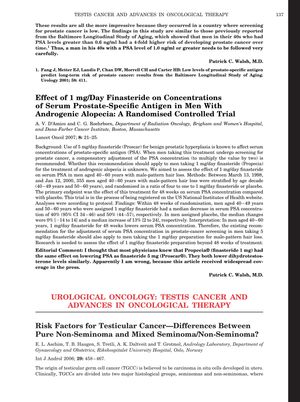Urological Oncology: Testis Cancer and Advances in Oncological Therapy
May 2007
in “
The Journal of Urology
”

TLDR Finasteride lowers PSA levels in men, certain factors increase testicular cancer risk, and current guidelines for penile cancer may lead to unnecessary surgeries.
The document discusses several studies related to urological oncology, including the effects of finasteride on prostate-specific antigen (PSA) levels and risk factors for testicular cancer. A randomized controlled trial involving 355 men aged 40-60 with male-pattern hair loss found that 1 mg/day finasteride for 48 weeks significantly lowered serum PSA concentration by 40% in men aged 40-49 and by 50% in men aged 50-60, compared to placebo. This suggests that the recommendation to adjust PSA concentration during prostate cancer screening for men taking 5 mg/day finasteride should also apply to those taking 1 mg/day for hair loss. Additionally, a large case-control study using data from the Medical Birth Registry of Norway (961,396 live-born boys) and the Cancer Registry of Norway identified several risk factors for testicular germ cell cancer (TGCC), such as low parity, low gestational age, epilepsy, and retained placenta. The study, which included 1,087 TGCC cases, suggested that non-seminomas and mixed seminoma/non-seminoma TGCCs might have partially different risk factors. Lastly, a prospective study of 100 cases of penile cancer managed according to European Association of Urology guidelines showed high overall survival, but indicated that the guidelines have limitations in predicting micrometastatic disease, leading to a high number of unnecessary prophylactic lymphadenectomies. More accurate molecular markers or novel staging techniques are needed to improve prediction of lymph node disease.




